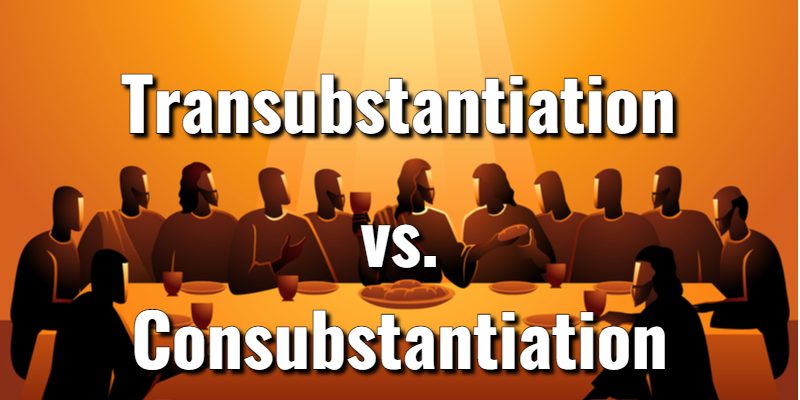Lord’s Library editors explore various church teachings by comparing transubstantiation vs. consubstantiation.
Communion (the Eucharist) is a religious practice with much significance to a number of Christian denominations. Through Communion, as the practice is known, believers experience the presence of Jesus in a unique way. It can also be described as an act of remembrance of Christ’s ultimate sacrifice which leads to the salvation of mankind. An example of Communion can be found in 1 Corinthians 11:23-26 in the Bible:
“For I have received of the Lord that which also I delivered unto you, that the Lord Jesus the same night in which he was betrayed took bread: And when he had given thanks, he brake it, and said, Take, eat: this is my body, which is broken for you: this do in remembrance of me. After the same manner also he took the cup, when he had supped, saying, this cup is the new testament in my blood: this do ye, as oft as ye drink it, in remembrance of me. For as often as ye eat this bread, and drink this cup, ye do shew the Lord’s death till he come.”
There are two distinct views among different Christian denominations when it comes to the brad and wine of Communion. They are transubstantiation vs. consubstantiation. In this resource, Lord’s Library editors explore the two interpretations for effective comparison. Comparing the two doctrines will also help us to gain a more complete understanding when asking the question “What is Communion?”
Transubstantiation vs. Consubstantiation
What is Transubstantiation? Transubstantiation Definition
Transubstantiation involves the change, but not appearance of, a substance (bread or wine) into the substance of the body of Jesus Christ during Communion. Transubstantiation is largely a doctrine of the Roman Catholic Church. It is explained in Section 1375 in the The Catechism of the Catholic Church:
“The Council of Trent summarizes the Catholic faith by declaring: ‘Because Christ our Redeemer said that it was truly his body that he was offering under the species of bread, it has always been the conviction of the Church of God, and this holy Council now declares again, that by the consecration of the bread and wine there takes place a change of the whole substance of the bread into the substance of the body of Christ our Lord and of the whole substance of the wine into the substance of his blood. This change the holy Catholic Church has fittingly and properly called transubstantiation.”
The doctrine of transubstantiation teaches that the bread of the Communion elements becomes the actual flesh of Jesus Christ when it is blessed by the Priest before the giving of the Eucharist. The same is true then of the wine; It is believed to become the actual blood of Christ as well.
Proponents of transubstantiation argue that Biblical evidence for this doctrine can be seen in John 6:53-57:
“Then Jesus said unto them, Verily, verily, I say unto you, Except ye eat the flesh of the Son of man, and drink his blood, ye have no life in you. Whoso eateth my flesh, and drinketh my blood, hath eternal life; and I will raise him up at the last day. For my flesh is meat indeed, and my blood is drink indeed. He that eateth my flesh, and drinketh my blood, dwelleth in me, and I in him. As the living Father hath sent me, and I live by the Father: so he that eateth me, even he shall live by me.”
Jesus’ emphasis that His “flesh meat indeed” and His “blood is drink indeed” forms the basis of argument on behalf of this doctrine. Transubstantiation is a hotly debated topic among different Christian denominations, especially those who see these verses as symbolism for larger truths about the faith. Regardless, there is great meaning behind the doctrine.
Transubstantiation Defined
What is Consubstantiation? Consubstantiation Definition
Consubstantiation is a Christian theological doctrine which holds that the body and blood of Jesus Christ are present alongside the substance of bread and wine. Consubstantiation is largely a doctrine of the Protestant Church.
For Christians who subscribe to consubstantiation, the elements of Communion are symbols which point to the spiritual importance of the body and blood of Christ to salvation. Consubstantiation originated during the Protestant Reformation of the 16th century. This makes the doctrine of transubstantiation much older, and explains why it was the primary doctrine of the church throughout much of its history.
Even in denominations which practice consubstantiation, Communion is still a respected practice. It’s just that the focus is shifted from the physical nature of the elements to the spiritual meaning behind the act. Overall, the sacrament retains an edifying presence in the faith of Christian believers.
Consubstantiation Defined
Transubstantiation vs. Consubstantiation; What’s the Difference?
Outside of this key difference, the doctrines of transubstantiation and consubstantiation view the Eucharist in the same way. It is a noteworthy doctrine if for no other reason than that it is practiced by denomination which makes up the largest total number of Christians around the world. The key difference is a physical vs. spiritual focus on Christ’s presence within the bread and wine, and the overall sentiment remains the same regardless of denomination.
Lord's Library participates in affiliate programs. We may make a small commission from products purchased through this resource.
- What Does the Bible Say About Achievements? With Key Scriptures - April 11, 2025
- What does the Bible Say About Abortion? With Key Scriptures - April 11, 2025
- Prosperity Gospel Meaning in the Scriptures: Is it Biblical? - April 7, 2025











